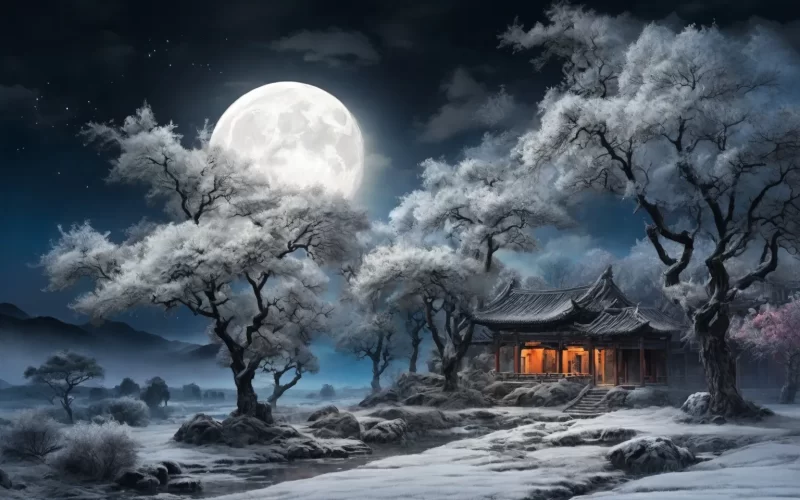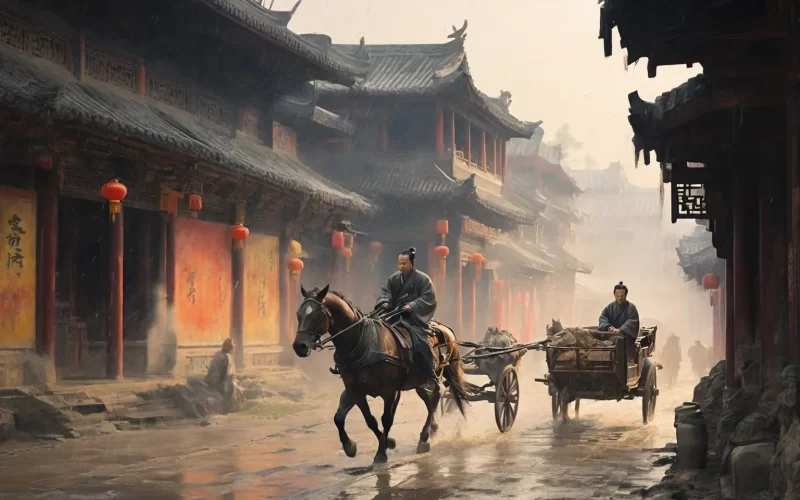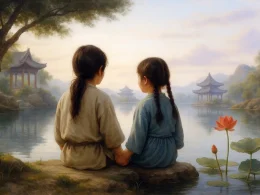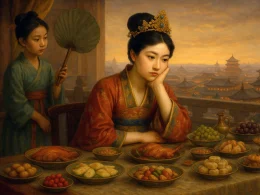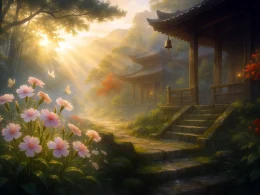A wanderer hears drums portending battle.
By the first call of autumn from a wildgoose at the border,
He knows that the dews tonight will be frost.
...How much brighter the moonlight is at home!
O my brothers, lost and scattered,
What is life to me without you?
Yet if missives in time of peace go wrong --
What can I hope for during war?
Original Poem:
「月夜忆舍弟」
杜甫
戍鼓断人行, 秋边一雁声。
露从今夜白, 月是故乡明。
有弟皆分散, 无家问死生。
寄书长不达, 况乃未休兵。
Interpretation:
"Remembering My Brothers on a Moonlight Night" was written in the autumn of 759 AD during the reign of Emperor Suzong of the Tang Dynasty. At the time, the An-Shi Rebellion was raging, with rebel forces advancing southward, and war engulfed regions like Henan and Shandong. Du Fu, living in Qinzhou, faced frequent famines and a life of hardship. His brothers were scattered, and he had no news of their whereabouts. Filled with worry and longing, Du Fu composed this poem to express his deep concern for his family.
First Couplet: "戍鼓断人行,秋边一雁声。"
Shù gǔ duàn rén xíng, qiū biān yī yàn shēng.
The watchtower drum halts travelers; a lone goose cries in the autumn frontier.
The opening couplet sets a desolate scene of an autumn night on the frontier. The drum from the watchtower signals the curfew, cutting off the movement of people, while the cry of a lone goose adds to the melancholic atmosphere. The "goose's cry" not only describes the scene but also symbolizes Du Fu's sorrow over his scattered brothers, evoking a sense of loneliness and despair.
Second Couplet: "露从今夜白,月是故乡明。"
Lù cóng jīn yè bái, yuè shì gùxiāng míng.
From tonight, the dew turns white; the moon shines brightest in my hometown.
This couplet uses the changing season and the moon to express Du Fu's homesickness. The arrival of the White Dew season marks the deepening chill of autumn, and the poet gazes at the moon, feeling a profound sense of longing. The line "the moon shines brightest in my hometown" captures the universal sentiment that the moon seems brighter and more beautiful when viewed from one's native place, emphasizing Du Fu's deep attachment to his homeland.
Third Couplet: "有弟皆分散,无家问死生。"
Yǒu dì jiē fēnsàn, wú jiā wèn sǐshēng.
My brothers are scattered; with no home, I cannot know if they live or die.
Here, Du Fu laments the dispersal of his brothers and the destruction of their family. His four brothers are separated in war-torn regions, and he has no way of knowing their fate. This couplet conveys not only his anxiety for their safety but also his grief over the fragmentation of their family, a poignant reflection of the personal toll of war.
Fourth Couplet: "寄书长不达,况乃未休兵。"
Jì shū cháng bù dá, kuàng nǎi wèi xiū bīng.
Letters I send never arrive, and the war shows no sign of ending.
The final couplet intensifies the sense of despair. The poet's letters to his family in Luoyang fail to reach their destination, and the ongoing war exacerbates the difficulty of communication. The word "何况" (let alone) underscores the hopelessness of the situation, highlighting the relentless turmoil of the era and Du Fu's deepening worry for his loved ones.
Overall Appreciation
The poem revolves around the theme of longing for his brothers, with each couplet deepening the emotional intensity. Du Fu begins with the desolate frontier scene, moves to his homesickness under the moonlight, then expresses his anguish over his scattered brothers and the destruction of their home, and finally laments the futility of communication amid the unending war. Though the language is simple, the emotions are profound and deeply moving.
Writing Characteristics
- Vivid Imagery, Blending Scene and Emotion
Du Fu uses images like the "watchtower drum," "lone goose," "white dew," and "moon" to create a melancholic atmosphere, allowing the emotions to emerge naturally from the scenery. - Layered Progression, Sincere Emotion
The poem progresses from the reality of the curfew and frontier life to the homesickness evoked by the moon, then to the worry over his brothers' fate, and finally to the despair caused by the unending war. Each layer deepens the emotional impact. - Simple Language, Profound Impact
The poem's language is straightforward and unadorned, yet it conveys deep emotion. Du Fu's plainspoken style makes his longing for his family and homeland all the more poignant.
Insights
This poem vividly portrays the suffering brought by war, particularly the pain of family separation and the destruction of homes. Through his sincere emotions and simple language, Du Fu captures the longing for family and homeland that resonates deeply in times of turmoil. In such turbulent times, the warmth of family becomes especially precious, reminding us to cherish moments of reunion and to care for our loved ones, preserving the warmth in our hearts.
Poem translator:
Kiang Kanghu
About the poet

Du Fu (杜甫), 712 - 770 AD, was a great poet of the Tang Dynasty, known as the "Sage of Poetry". Born into a declining bureaucratic family, Du Fu had a rough life, and his turbulent and dislocated life made him keenly aware of the plight of the masses. Therefore, his poems were always closely related to the current affairs, reflecting the social life of that era in a more comprehensive way, with profound thoughts and a broad realm. In his poetic art, he was able to combine many styles, forming a unique style of "profound and thick", and becoming a great realist poet in the history of China.






